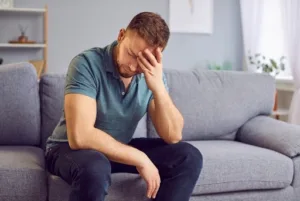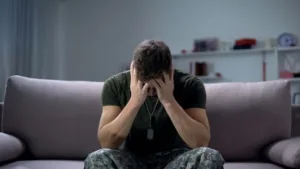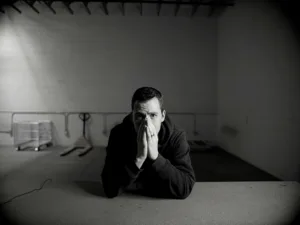Before we get into the 1in6 statistic, I want to say good work. If you are reading this you might be taking the first steps in the right direction on a healing journey. You might be a man or a loved one who has decided that silence and shame are no longer an option. Please know that you are not alone and recovery is possible.
1in6, a term representing the startling statistic that at least one in six men has experienced sexual abuse or assault, sheds light on a pervasive issue often overlooked. Our society does not talk about male sexual abuse and assault which gives the impression that it does not happen. This silence can leave these men and boys feeling isolated, different, weak, or worthless. This figure underscores the importance of raising awareness, providing support, and fostering understanding for male survivors of sexual trauma. By acknowledging this statistic, we take a crucial step towards creating a more inclusive and compassionate society where all survivors feel seen and heard.
Men and Boys Can Be Sexually Abused
Male Sexual Abuse Myths
There is a myth that males can not be sexually abused. Sexual violence against men and boys is a prevalent issue often ignored in society. It includes a wide range of abuse like rape, unwanted sexual touching, coercion, sexual hazing, and assault, which can result in trauma symptoms and PTSD. The abuse can happen once or be ongoing.
Despite misconceptions, male sex abuse occurs across all ages, races, and sexual orientations. Perpetrators can be male, female, acquaintances, family members, or strangers. Put another way, men, boys, women, and girls can be sexually abused.
Another common myth is that if a male gets an erection or ejaculates they want the abuse to happen. We often hear from male survivors, “I am so confused because I did not want the abuse, but my body responded like it did.” This can be confusing for the male survivor. Here are the facts; male genitals and anus have many nerve endings and are very sensitive, responding to stimulation which is something we can’t control. Many men can recall an experience where their genitals were unintentionally stimulated (like riding the bus) and out of nowhere they got an erection. Men and boys can become sexually aroused during unwanted sexual contact and this does not mean they wanted the abuse to happen. If the abuser was a male, survivors sometimes question their sexual orientation. The fact is that sexual abuse is not the same as healthy sexual contact. Sexual abuse is a crime and the only person responsible for the abuse is the abuser.
Impact on Survivors
Sexual violence survivors may experience many complex emotions like shame, fear, anxiety, and confusion. They can also experience PTSD or Complex PTSD, depression, anxiety, and sexual dysfunction. Depending on the age of the abuse, the feelings and thoughts about themselves and the abuse may evolve. They can have trouble trusting others and being close in future relationships. We often see adult male survivors of childhood sex abuse do not disclose or seek treatment for the abuse until they become adults.
It’s important to get help from people you trust or organizations that focus on healing from trauma. Therapy and counseling can help in recovering and dealing with the pain. Remember you are not alone and there is help.
Understanding Sexual Violence Prevalence
Male Victims
1 in 6 Males: Approximately 1 in 6 males in the United States have experienced sexual abuse or assault, highlighting the significant prevalence of this issue among men and boys. This number could be even higher because male sexual abuse goes underreported.
Statistics and Data: The data on male sexual abuse is concerning, with studies indicating that a substantial number of males have been victims of sexual violence at some point in their lives.
Male sexual abuse often goes underreported, with many survivors choosing to keep their experiences to themselves for a number of reasons. One reason we hear in our work with male survivors is that they feared that if they were told they would be shamed, seen as weak, or judged. This makes sense, if society never talks about male sexual abuse, this gives the impression that it does not happen. This can often leave the male survivor feeling they are the only one, compounding the shame, isolation, and harm. This underreporting of incidents leads to a lack of accurate data on the true extent of male sexual violence.
Historical Oversight of Male Abuse
Societal Influence
Humans have a long history of denying that child sex abuse is a reality for males and females. Societal norms have perpetuated the myth that males are less likely to be victims of abuse or that they can not be sexually abused. This myth has caused male survivors a lot of harm and has led to a lack of support, access to treatment, and research on best interventions. Many men were often expected to be strong, stoic, and impervious to harm. Our medical and mental health systems have failed to address this by creating male-friendly or welcoming services which has created barriers for them to report or seek help.
In the US researchers have shown that we have a stereotype of women as victims and men as perpetrators. Despite the prevalence of male abuse, stereotypes in our culture surrounding masculinity have hindered the acknowledgment and support of male survivors. The notion that men should always be in control and dominant has marginalized those who have experienced abuse.
Recognition Progress
Over time, there have been significant turning points in recognizing and addressing female sex abuse. Movments like #MeToo have brought awareness to female sexual abuse. Organizations like 1in6 have played a crucial role in advocating for male survivors and raising awareness about their experiences. Through campaigns, support groups, and educational programs, they have helped break the silence surrounding male abuse.
In recent years, there has been a gradual shift towards inclusivity in discussions about abuse, acknowledging that men too can be victims. This shift has paved the way for more resources and support systems tailored specifically for male survivors of abuse.
Mental and Physical Health Impacts
Mental Health
Male survivors of sexual abuse often experience a range of mental health consequences, including trauma-related conditions such as PTSD and complex PTSD. Survivors are also at risk of male depression and anxiety. These individuals may struggle with feelings of shame, guilt, and worthlessness due to their adverse childhood experiences. The impact of such trauma can lead to difficulties in forming and maintaining relationships, attachment issues, negative self-esteem, and challenges in regulating emotions. Seeking therapy and support groups can aid in addressing these psychological effects.
Physical Health
The physical health impacts resulting from male sexual assault can be significant. Male survivors may experience sexual dysfunction like erectile dysfunction. Survivors may face a higher risk of developing chronic health conditions such as cardiovascular diseases, gastrointestinal problems, and autoimmune disorders. The stress and trauma associated with the abuse can weaken the immune system, making individuals more susceptible to illnesses. Engaging in unhealthy coping mechanisms like substance abuse or self-harm can further deteriorate physical well-being.
Long-Term Effects on Overall Well-Being
The long-term effects on the overall well-being of male survivors of sexual abuse are profound. These individuals may experience ongoing struggles with self-esteem, body image issues, and intimacy concerns. Many of the men we work with at Denver Men’s Therapy describe feeling “lost and don’t know who I am.” The trauma endured during childhood can have lasting repercussions on their mental, physical, and emotional health throughout adulthood. Developing healthy coping strategies, building a strong support network, and prioritizing self-care are crucial for male survivors to navigate the long-term effects of their experiences.
Psychotherapy Benefits for Survivors
Tailored Approaches
Psychotherapy offers tailored approaches to help male survivors of sexual abuse. Therapists use various techniques to address the unique needs and challenges faced by survivors.
Eye Movement Desensitization and Reprocessing (EMDR) therapy is a well-established treatment that can be particularly beneficial for adult survivors of childhood sexual abuse. EMDR therapy helps individuals process and integrate traumatic memories through structured sessions involving bilateral sensory input, such as side-to-side eye movements. EMDR therapy reduces the long-term effects of traumatic experiences by enabling the brain to reprocess these memories in a way that decreases their emotional impact. Many men find that after EMDR, they experience a significant reduction in the distress associated with their traumatic memories, leading to improved emotional stability and better mental health.
Coping Mechanisms
Therapy provides male survivors with essential coping mechanisms to navigate the aftermath of trauma. Through sessions, survivors learn how to manage triggers, regulate emotions, and build resilience.
Healthy Coping Skills for men include:
1. Group Therapy: Many men prefer group therapy over individual therapy. Groups provide a safe space to relate with other male survivors.
2. Mindfulness Practices: Techniques like meditation, deep breathing, and yoga can help manage anxiety and emotional regulation.
3. Physical Activity: Regular exercise, such as running, lifting weights, hiking, swimming, or team sports, can boost mood and reduce stress.
4. Journaling: Writing down thoughts and feelings can serve as a therapeutic outlet, helping to make sense of internal experiences.
5. Artistic Expression: Activities that involve creating something or engaging with the hands like painting, music, or writing can enable expression in ways that words may not fully capture.
6. Support Groups: Joining a group of individuals with similar experiences can provide understanding, validation, and community.
One significant benefit of psychotherapy is the emotional support it offers male survivors. Therapists, trained in trauma-informed care, create a safe space for survivors to express their feelings without judgment.
Therapeutic relationships built on trust and empathy can help survivors process complex emotions and experiences.
Having a supportive environment encourages survivors to explore difficult memories and work towards healing.
Self-Empowerment
Therapy promotes self-empowerment among male survivors by helping them reclaim their sense of agency and autonomy. Through empowerment-focused interventions, survivors rebuild self-esteem and confidence.
By recognizing their strengths and resilience, survivors can overcome feelings of helplessness and vulnerability.
Therapy encourages survivors to set boundaries, assert their needs, and make empowered choices in their lives.
Holistic Healing
Therapeutic interventions encompass holistic healing for male survivors, addressing not just psychological but also physical and spiritual aspects. This approach recognizes the interconnectedness of mind, body, and spirit in the healing process.
Integrative therapies like mindfulness practices or ketamine-assisted psychotherapy can complement traditional talk therapy.
A holistic approach ensures comprehensive care that supports male survivors in all dimensions of their recovery journey.
Importance of Disclosure Benefits
Psychological Impact
Disclosing sexual abuse experiences can alleviate the burden carried by male survivors. Sharing these experiences with a trusted individual can provide a sense of relief and validation. We hear from many clients “For years I didn’t tell anyone. The longer I kept it to myself the shame grew. But when I finally told it was like the shame was lifted.” Sharing the abuse story must be done with a loving and safe person. Sharing allows survivors to feel heard and supported, which is essential for their psychological well-being. It should be noted that you should never feel forced to share your story. You decide who, if, and when you want to share.
“You can’t heal what you don’t reveal” – Jay-Z
Opening up about past abuse fosters a sense of empowerment and control for male survivors. By breaking the silence and sharing their stories, survivors reclaim their agency over their experiences. This act of disclosure helps survivors regain a sense of self-worth and autonomy that may have been shattered by the abuse they endured.
National Support and Local Resources Availability
Overview of Support Resources
1in6 is a national organization providing support for male survivors of childhood sexual abuse. They offer online resources, helplines, and in-person support groups.
MaleSurvivor is another prominent organization offering resources for male survivors, including therapy referrals and online support forums.
The National Sexual Assault Hotline (800-656-HOPE) provides confidential support and connects survivors with local resources, including counseling services and legal assistance.
Colorado Organizations for Male Survivors
Wings Foundation in Colorado provides direct support to male survivors in their communities. These chapters organize events, workshops, and support groups.
Preventing Sexual Violence through Education
Educating Communities
Community education plays a crucial role in preventing sexual violence against males. By providing information and resources to communities, awareness about male abuse can be increased.
Educational initiatives within communities help break the silence surrounding male abuse. Information sessions, workshops, and training programs empower individuals to recognize signs of abuse and intervene effectively.
Impact of Prevention Programs
Prevention programs have a significant impact on creating safer environments for males. By educating individuals on consent, boundaries, and respect, these programs foster a culture of accountability and support for victims.
Empowering communities with knowledge about sexual violence equips them to take action and support survivors. Through open dialogue and education, the stigma associated with male abuse is reduced, encouraging more victims to seek help.
Summary
Understanding the prevalence of sexual violence against men and boys is crucial. Historical oversights have perpetuated misconceptions, impacting survivors’ mental and physical health. Psychotherapy offers significant benefits, aiding in recovery and healing. Disclosing abuse experiences can be empowering, leading to support and resources for survivors. National and local organizations play a vital role in providing assistance.
Preventing sexual violence through education is key. By raising awareness, promoting healthy masculinity, and supporting survivors, we can create a safer environment for all. Take action today by supporting organizations like 1in6 that advocate for male survivors and work towards ending sexual violence. Your voice and actions matter in creating a society free from abuse.
Frequently Asked Questions
What is the significance of the “1in6” search query?
“1in6” represents the statistic that 1 in 6 men have experienced sexual abuse or assault. It highlights the prevalence of male survivors and the importance of addressing their unique needs and challenges.
How does sexual violence impact mental health?
Sexual violence can lead to various mental health issues like PTSD, anxiety, and depression. Survivors may experience flashbacks, nightmares, and trust issues, affecting their overall well-being.
What are some benefits of psychotherapy for survivors of sexual abuse?
Psychotherapy can help survivors process trauma, manage symptoms, and improve coping strategies. It provides a safe space to explore emotions, build resilience, and work towards healing from past experiences.
Why is it important for survivors to disclose their experiences?
Disclosure can be empowering for survivors by breaking the silence and seeking support. Sharing their story can lead to validation, healing, and accessing resources for recovery and justice.
How can education play a role in preventing sexual violence?
Education plays a crucial role in raising awareness, promoting consent culture, and challenging harmful attitudes towards gender and sexuality. By educating individuals from a young age, we can create a safer society free from sexual violence.






